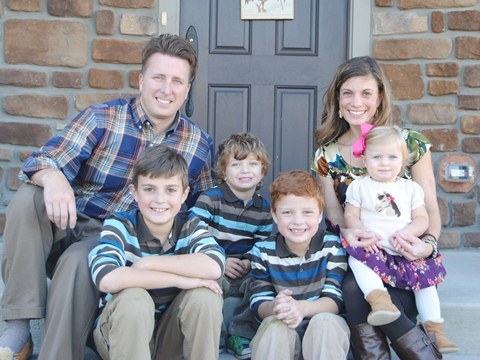Why I Stayed

There have been many discussions, anecdotes, and studies surrounding how the church has failed to capture the imagination and hold the attention of young adults. When I was recently asked to share my testimony, I began to realize the debt that I owe to the church and why the church continues to be relevant to my spiritual journey.
I grew up in the Church of the Nazarene. My parents modeled well what it meant to be a Christian and did their best to communicate the same to me and my sisters. They were part of the committed core at our local church. Mom and Dad co-taught an adult Sunday School class. Dad was secretary of the church board and Mom was missionary president. Our lives literally revolved around the cadence call of the church. When the doors were open, we were there.
It's hard to remember a time when I was not aware that God loved me. My conversion experience was more like walking into the sunrise rather than being hit by a bolt of lightning.
At the age of five or six, I remember going to the altar to accept Christ into my heart and asking him to forgive my sins. When I was in the fourth or fifth grade, during a children's camp in Northeast Maryland, I remember having a second spiritual experience of committing my life to Christ, expressing a willingness to go wherever and do whatever God asked of me.
While I attended public school until college, the strength of the connection to my local church caused me to understand that my values and identity were not to be found in a secular curriculum and culture. Although I enjoyed activities with non-Christian friends, from soccer to band to the National Honor Society, I knew that we were different.
In some ways, I was like a foreign exchange student—speaking a different language, coming from a different culture, and having an allegiance to a different sovereign. I was reminded of this fact at my high school reunion when a soccer teammate of mine curiously asked my wife if I still didn't curse.
However, in many ways, those high school years were defined by what I didn't do, rather than what I did do. It wasn't until college and then law school that I was stretched to think more about what I believed than what I was to avoid.
Attending Eastern Nazarene College (ENC) provided me the opportunity to sort through the issues that were fundamental to my faith and in what areas I needed to be more gracious. I was given the freedom to test out my faith and to disassemble and reconstruct my beliefs, without leaving me worse off for the process. This is not to say that I always made the best choices, but ENC was a safe place where I could grow and at times fail, while moving forward in my spiritual development.
During law school, I went on a two-week mission trip to Iquitos, Peru, and experienced that sweet spot in life where I found my vocation to be fully integrated with the tasks of my every day. As we laid the foundation for a Nazarene ministry center, I think the foundation was laid for me to look for a legal career with other believers who shared my world view. In this regard, I've been privileged to be partnered in my law practice with attorneys whose conversations about faith and spirituality are the norm and not the exception.
The church has been the vehicle through which I have found a place to serve and be connected to the body of Christ. The church has provided an environment for me to grow spiritually at every stage of my life. As a child, it was through Sunday School, VBS, talent programs, Bible quizzing, and camps. Entering adolescence, it was through a vibrant teen program, Festival of Life, Nazarene World Youth Congress, and teen and family camps.
As a young adult, I benefited from a church-supported college where there was, as Dean Bertha Munro said, 'no conflict between the best in education and the best in our Christian faith.' The church was where I met my wife and it's where I want my kids to be raised within a community of believers who inspire them to live a life for Christ in service to his kingdom.
Looking toward the spiritual journey that lies ahead, my deepest concern relates to what I am contributing to the next generation of followers of Jesus Christ, especially my children. While the church's mission has never changed, the way in which we demonstrate relevancy in the meaning of the gospel must.
J. B. Phillips said, "The real danger for professing believers lies not in the more glaring and grosser temptations and sins, but in a slow deterioration of vision, a slow death to daring, courage and a willingness to adventure."
My prayer is that I will have such courage, and that the church will continue to be the place where the adventure begins.
Jonathan Russell is an attorney and layman who grew up in the Collingdale, Pennsylvania Church of the Nazarene and is presently a member of the Immanuel/Lansdale, Pennsylvania Church of the Nazarene, where he, his wife, Jan, and their four children worship together.
Holiness Today, January/February 2013
Please note: This article was originally published in 2013. All facts, figures, and titles were accurate to the best of our knowledge at that time but may have since changed.




